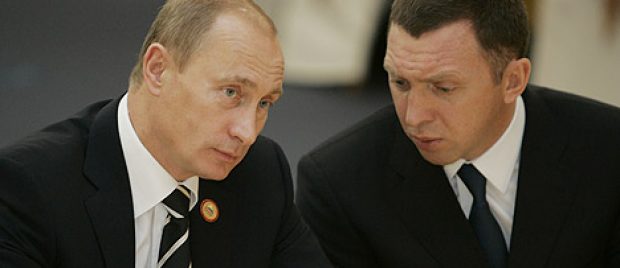Two reports came out Monday providing new details about Trump associates’ contacts with businessmen reportedly linked to the Russian government.
The Atlantic reported more details about a series of emails that Trump campaign chairman Paul Manafort exchanged with a Ukrainian business partner last year, just after he joined the Trump team.
The emails, which have been turned over by the Trump campaign to Special Counsel Robert Mueller, appear to show Manafort trying use his position on the Trump campaign to curry favor with a Russian oligarch with whom he had a business dispute.
And The Washington Post reported on emails that Michael Cohen, an attorney for Trump’s real estate company, Trump Organization, exchanged with a Russia-born real estate developer who claimed to have direct access to senior Russian government leaders.
Those documents, which have also been turned over to Mueller, reportedly show that Cohen was invited to meet top Russian officials at an economic forum in St. Petersburg last June, an offer that he ultimately declined.
Mueller, a former FBI director, has been provided the documents as part of his sprawling investigation into Russian interference in the presidential campaign. While the investigation has generally been portrayed as a probe into possible collusion between the Trump campaign and Russian government, Mueller is also looking at whether Russian operatives made covert attempts to infiltrate Trumpworld.
While the latter scenario would be embarrassing for the Trump team, it would be much less nefarious than direct cooperation with the Kremlin.
The Atlantic report covers emails that Manafort exchanged last April with Konstantin Kilimnik, a Ukrainian political operative who has alleged ties to Russian intelligence. Some of their exchanges were reported last week by The Post, but The Atlantic was provided details from additional documents. (RELATED: Manafort Offered To Provide ‘Private Briefings’ To Kremlin-Connected Oligarch)
“I assume you have shown our friends my media coverage, right?” Manafort wrote to Kilimnik in an apparent reference to Deripaska.
“Absolutely. Every article,” wrote back Kilimnik, who worked with Manafort on a campaign for a pro-Russia political party.
“How do we use to get whole. Has OVD operation seen?” Manafort asked, referring again to the billionaire Deripaska.
Kilimnik then told Manafort that he had forwarded all information to one of Deripaska’s aides.
“Frankly, the coverage has been much better than Trump’s,” Kilimnik continued, adding that, “In any case it will hugely enhance your reputation no matter what happens.”
While it is not entirely clear what Manafort and Kilimnik were discussing, the Trump campaign chairman and Deripaska were at that time embroiled in a dispute over a business deal for a Ukrainian cable television company. Deripaska had accused Manafort, who he met in 2005, of squandering $19 million in that deal.

Vladimir Putin and Oleg Deripaska at APEC Summit, November 2006. (Photo: President of the Russian Federation/Wikimedia Commons/www.kremlin.ru)
The email exchanges have led to speculation that Manafort was using his position on the Trump campaign — which he took without pay — in order to improve his position with Deripaska. What Deripaska wanted in return is a question that Mueller’s team of investigators is likely exploring. Manafort left the Trump campaign last August after revelations about his consulting work for the League of Nations, a political party tied to Ukraine’s former prime minister, Viktor Yanukovych.
While most of Manafort’s emails with Kilimnik appear to revolve around business dealings with Deripaska, they grew more cryptic later in the campaign.
“I met today with the guy who gave you your biggest black caviar jar several years ago,” Kilimnik wrote in a July 29 email to Manafort. The Post reported last week that investigators believe that “caviar” is a reference to payments.
“We spent about 5 hours talking about his story, and I have several important messages from him to you. He asked me to go and brief you on our conversation. I said I have to run it by you first, but in principle I am prepared to do it, provided that he buys me a ticket. It has to do about the future of his country, and is quite interesting. So, if you are not absolutely against the concept, please let me know which dates/places will work, even next week, and I could come and see you,” Kilimnik wrote.
Manafort responded, writing, “Tuesday is best.”
Mueller has recently ramped up his focus on Manafort, a longtime GOP political consultant who joined the Trump team last March. In July, Mueller obtained a search warrant for Manafort’s Virginia residence and reportedly took financial documents and tax records. Mueller’s prosecutors have also reportedly told Manafort that he will likely be indicted for money laundering and tax crimes.
Spokespeople for both Manafort and Deripaksa have said that neither man met last year or discussed the presidential campaign. Kilimnik recently told Radio Free Europe that he believes that Manafort could be indicted on money laundering crimes because of his foreign consulting work, but that he was not involved in any campaign collusion.
Cohen’s email exchanges were with Felix Sater, a Russian emigre who has done real estate deals with Trump’s company in the past. Sater, who was imprisoned in the 1990s after he stabbed a man with a martini glass at a Manhattan bar, has reportedly been linked to the Russian mafia.
According to The Post, Sater invited Cohen to the St. Petersburg International Economic Forum, a conference held annually in the northern Russian city.
Sater told Cohen that he could be introduced to Russian Prime Minister Dmitry Medvedev and possibly to Putin. Sater also told Cohen that Kremlin spokesman Dmitry Peskov could arrange his visit, including helping with a visa.
Cohen declined the offer, citing the proximity to the Republican National Convention. He told The Post that he has never visited Russia.
Months before that exchange, in late 2015, Sater and Cohen were working on a deal to build a Trump Tower in Moscow. That deal ultimately fell through.
WATCH U.S. INTELLIGENCE OFFICIALS DISCUSS RUSSIAN ELECTION HACKING:


